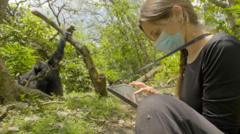In a remarkable display of animal intelligence, chimpanzees in Uganda have been documented using local medicinal plants for self-treatment, according to a study from researchers at the University of Oxford and a local team. Filmed in the Budongo Forest, these wild chimps employed a variety of healing techniques to address open wounds and other injuries, reinforcing their remarkable adaptability in the wild.
Building on previous findings from last year, the scientists have compiled decades worth of observations, creating a comprehensive catalog of the diverse ways chimpanzees engage with nature to perform “forest first aid.” The study, published in the journal *Frontiers in Ecology and Evolution*, contributes to an expanding body of evidence showing that not only chimps but also orangutans and gorillas are capable of using natural resources to enhance their health.
Lead researcher Elodie Freymann explained that chimpanzees exhibit a variety of behaviors to self-treat injuries and maintain hygiene. Their methods range from dabbing the leaves on wounds to chewing and applying the plant material directly onto injuries. Notably, researchers recorded an instance of a young female chimp tending to its mother’s injury. Remarkably, chimps were also documented aiding unrelated individuals, showcasing their potential for empathy.
Decades of anecdotal evidence compiled from observers in the field have revealed numerous instances of chimpanzee medicinal practices. Some documented behaviors include using leaves to clean themselves after defecation and removing traps from each other. Previous research has identified several plant-based remedies favored by these primates, many of which display antibacterial properties.
Furthermore, they are not the only non-human apes engaging in such behaviors; recent studies have indicated that orangutans also use chewed foliage to heal wounds. Examining these wild practices and the specific plants these chimps utilize could possibly unlock new medicinal treatments for humans.
Dr. Freymann emphasized the profound knowledge that these chimpanzees possess about their environment, contrasting it with human inadequacies in survival in the wild. “If I were plopped down here in this forest with no food and no medicine, I doubt that I’d be able to survive for long,” she stated. "Yet chimpanzees thrive here because they understand how to utilize the resources around them."



















